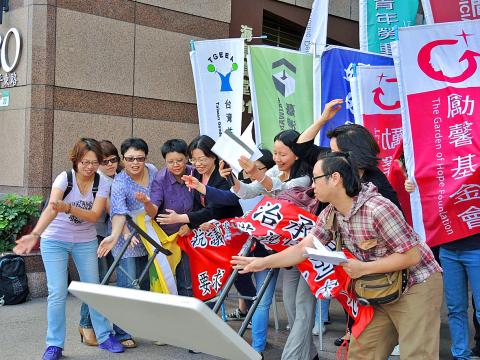The Democratic Progressive Party (DPP) has not only failed to live up to the legacy of Peng Wan-ju (彭婉如), but the government under the nation’s first female president will feature a 40-member Cabinet with just four women, women’s rights groups said yesterday during a protest outside DPP headquarters in Taipei.
During the protest, an article published in yesterday’s Liberty Times (the Taipei Times’ sister newspaper) by women’s rights campaigner Lee Yuan-chen (李元貞) was read out loud.
Lee, who served as national policy adviser to former president Chen Shui-bian (陳水扁), criticized the gender imbalance in the proposed Cabinet.

Photo: CNA
Tsai’s gender equality policy in 2012 promised that the gender ratio in governments — whether local or central, and regardless of pay grade — would at least be one-third women, but the last time there were so few women in the Cabinet was under then-premier Vincent Siew (蕭萬長) in 1997, she wrote. Tsai’s recent predecessors have done better, Lee said, referring to President Ma Ying-jeou (馬英九) and Chen.
Representatives of the Awakening Foundation, the Homemaker Union Consumer Co-op, the Garden of Hope Foundation and other groups put on a short play during the protest, showing Tsai closing a door behind her and picking just male staff.
Lee said she turned down an invitation to Tsai’s post-inaugural banquet because even though she is happy to see Tsai become the nation’s first female president, Tsai has “failed to live up to Peng’s legacy of introducing women to politics in the DPP.”
Peng, director of the DPP’s Women’s Affairs Department before she was murdered on Nov. 30, 1996, in Kaohsiung, is remembered for pushing for a legal amendment guaranteeing that at least one-quarter of all politicians should be female.
Garden of Hope Foundation executive manager Chi Hui-jung (紀惠容) said women’s rights groups will not give Tsai a honeymoon period after her inauguration because of her disappointing performance so far.
The groups plan to closely monitor Tsai’s administration.
Premier-designate Lin Chuan (林全) evidently lacks a sensitivity to gender issues since his Cabinet list includes many middle-aged to elderly men, Chi said, adding that the groups would watch how Lin’s Cabinet handles gender issues.
Executive Yuan spokesperson-designate Tung Chen-yuan (童振源) said that while Lin had reached out to many women, the “current results are not what was anticipated, but we are working toward that goal.”
The incoming government’s policies and decisions would emphasize the different thoughts across genders and seek to encourage women to enter politics, Tung said, adding that the incoming government hoped for “women in government’ to be a mainstream value in Taiwan’s future.

LIMITS: While China increases military pressure on Taiwan and expands its use of cognitive warfare, it is unwilling to target tech supply chains, the report said US and Taiwan military officials have warned that the Chinese People’s Liberation Army (PLA) could implement a blockade within “a matter of hours” and need only “minimal conversion time” prior to an attack on Taiwan, a report released on Tuesday by the US Senate’s China Economic and Security Review Commission said. “While there is no indication that China is planning an imminent attack, the United States and its allies and partners can no longer assume that a Taiwan contingency is a distant possibility for which they would have ample time to prepare,” it said. The commission made the comments in its annual

DETERMINATION: Beijing’s actions toward Tokyo have drawn international attention, but would likely bolster regional coordination and defense networks, the report said Japanese Prime Minister Sanae Takaichi’s administration is likely to prioritize security reforms and deterrence in the face of recent “hybrid” threats from China, the National Security Bureau (NSB) said. The bureau made the assessment in a written report to the Legislative Yuan ahead of an oral report and questions-and-answers session at the legislature’s Foreign Affairs and National Defense Committee tomorrow. The key points of Japan’s security reforms would be to reinforce security cooperation with the US, including enhancing defense deployment in the first island chain, pushing forward the integrated command and operations of the Japan Self-Defense Forces and US Forces Japan, as

IN THE NATIONAL INTEREST: Deputy Minister of Foreign Affairs Francois Wu said the strengthening of military facilities would help to maintain security in the Taiwan Strait Japanese Minister of Defense Shinjiro Koizumi, visiting a military base close to Taiwan, said plans to deploy missiles to the post would move forward as tensions smolder between Tokyo and Beijing. “The deployment can help lower the chance of an armed attack on our country,” Koizumi told reporters on Sunday as he wrapped up his first trip to the base on the southern Japanese island of Yonaguni. “The view that it will heighten regional tensions is not accurate.” Former Japanese minister of defense Gen Nakatani in January said that Tokyo wanted to base Type 03 Chu-SAM missiles on Yonaguni, but little progress

NO CHANGES: A Japanese spokesperson said that Tokyo remains consistent and open for dialogue, while Beijing has canceled diplomatic engagements A Japanese official blasted China’s claims that Japanese Prime Minister Sanae Takaichi has altered Japan’s position on a Taiwan crisis as “entirely baseless,” calling for more dialogue to stop ties between Asia’s top economies from spiraling. China vowed to take resolute self-defense against Japan if it “dared to intervene militarily in the Taiwan Strait” in a letter delivered Friday to the UN. “I’m aware of this letter,” said Maki Kobayashi, a senior Japanese government spokeswoman. “The claim our country has altered its position is entirely baseless,” she said on the sidelines of the G20 summit in Johannesburg on Saturday. The Chinese Ministry